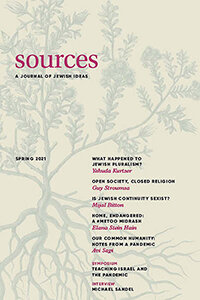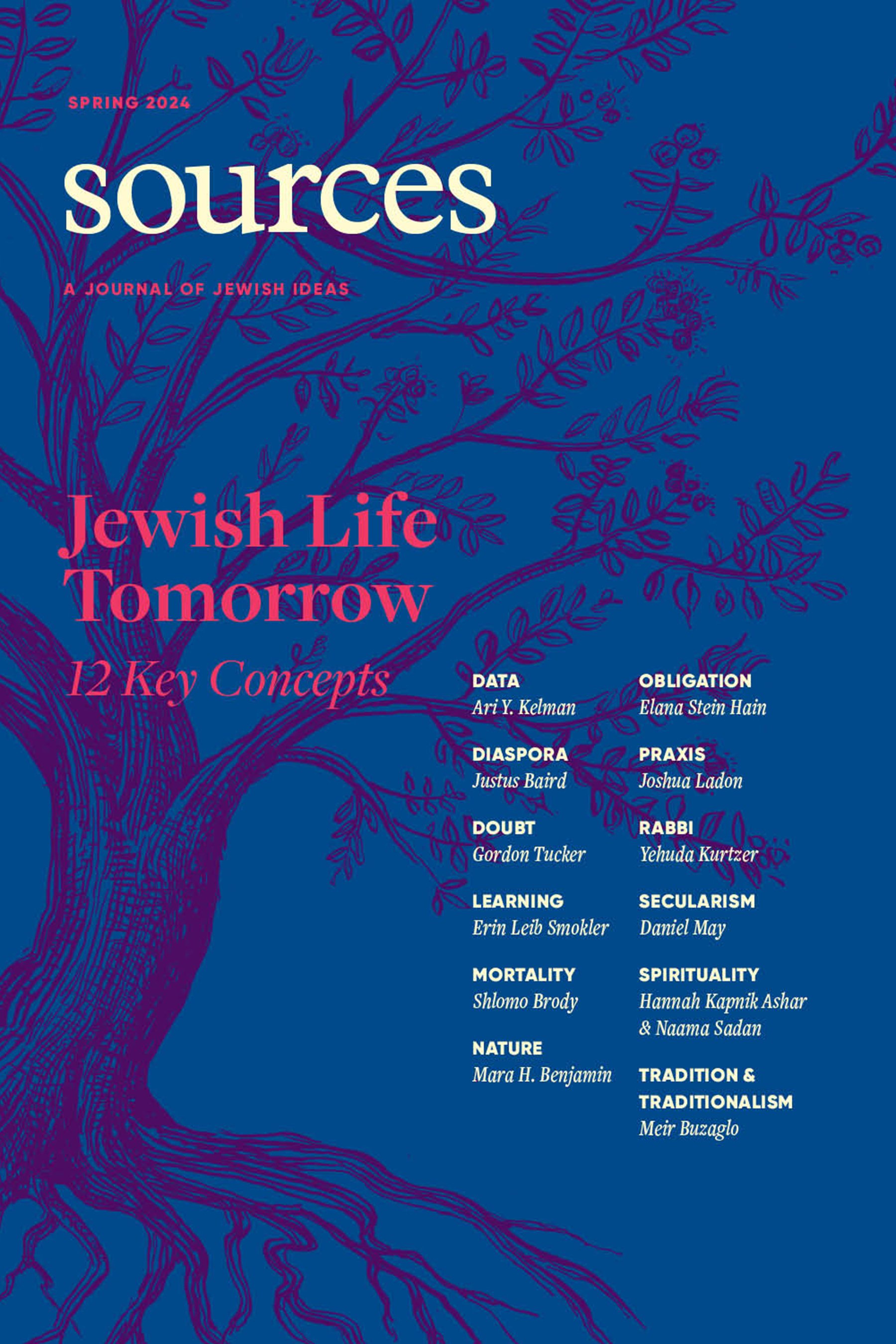Daring to Know
Dan Friedman
Dan Friedman is contributing editor of Sources.
BOOKS
The Blessing and the Curse
By Adam Kirsch
W. W. Norton, 304 pages, $30.00
IN HIS EPOCH-MAKING 1784 essay “What is Enlightenment?” Immanuel Kant exhorted his readers: “sapere aude” — “dare to know!” At the time, Kant was a well-respected professor at the university of Königsberg in Prussia and the famous author of the Critique of Pure Reason. Little could he have dreamt how loudly his Latin quotation from Horace would reverberate through the centuries. And especially to the Jews.
For Prussian Jews of the late eighteenth century, being prudent was a necessity, being a professor was an impossibility, and “daring to know” was a luxury beyond the means of most. Unless they were officially “tolerated,” they were legally required to leave the country. Tolerated Jews could stay but neither permanently settle nor buy land or property nor, indeed, could they engage in any commercial activity whatsoever. Apart from a few hundred families of Schutz-Juden (“protected Jews”), Jews were not generally allowed to live in cities, including Königsberg. In the centuries following, restrictions on Jews were significantly loosened — not least because of the Enlightenment that Kant had articulated. By the end of the twentieth century, Jews had inalienable rights to reside and to vote in western countries; in turn, they produced local Nobel laureates and Jewish members of government.
The manner in which Jews dare to know intrigues the literary critic Adam Kirsch, author of the new book The Blessing and the Curse: The Jewish People and Their Books in the Twentieth Century. Sometimes that takes the shape of an investigation into Jewish wisdom on its own terms — as with his seven-year Daf Yomi project at Tablet, where he wrote about daily reading a page of Talmud. More often, though, Kirsch’s books have investigated the ways in which Jews have written texts whose wisdom, whether classical or modern, extends to societies beyond the Jewish community.
In The People and The Books (2016), Kirsch read “18 classics of Jewish literature” spanning scripture, philosophy, memoir, and fiction. It’s a critical exercise that addresses millennia of literary production. Later, in his 2019 collection of essays, Who Wants to Be a Jewish Writer? Kirsch interrogated the ways in which literature can affect the world beyond the printed page. Sometimes the connection is an element of filiation or affiliation. In other instances, he wonders about “the ethical and political force that Auden famously denied when he wrote that ‘poetry makes nothing happen.’”
“A captivating new book aims to offer “a richer and freer sense of what Judaism has been and can be.””
Kirsch’s captivating new book, The Blessing and the Curse, picks up chronologically where The People and the Books leaves off. Its intention, Kirsch notes, is “to introduce readers to some of the most significant and compelling Jewish books of the twentieth century, and to use these books to explore central aspects of Jewish experience.” Like the earlier book, here Kirsch aims to offer “a richer and freer sense of what Judaism has been and can be.”
His analysis of Isaac Babel and his context as a Jewish solder-writer in revolutionary Russia is particularly inviting:
Babel delicately suggests that he himself is torn between the stern Communist vision of the future and the gentle Jewish spirit of the past.That self-division is one of the central themes of Red Cavalry, and Babel makes clear that it is a product of the narrator’s anomalous position as a Jew among Russian soldiers.
Moving from the “devastation of World War I” to Babel’s “murder in one of Stalin’s camps in 1940,” Kirsch opens our eyes to the political context and the social questions that are at stake for the writer and his narrator. He masterfully ties Jewish alienation back to the preceding essay on Arthur Schnitzler: “Here is the same Jewish dream that Schnitzler’s alienated urban Jews knew — the dream of being inconspicuous, of simply belonging.”
In this way — cogently, fluently, and convincingly — Kirsch charts some of the approaches that Jews made to Enlightenment culture during a century marked by three interrelated phenomena: the ongoing haskalah, or Jewish emancipation into citizenship; the era-defining tragedy of the Holocaust; and the miraculous coming-into-being of Israel as a Jewish state.
Over the course of 32 brief essays—each dovetailing with the previous like a thoughtfully crafted textbook—he traces the twentieth century history of Ashkenazi Jews in Europe, America, and Israel.
Kirsch divides the book into four sections. The first, “Europe: The Future Disappears,” examines Europe up to and including the Holocaust. The second, “America: At Home in Exile,” traces American Jewry’s increasing confidence. The third, “Israel: Life in a Dream,” examines the mythic establishment of Israel and how the reality of the state in the Middle East conflicts with the dream of a Jewish homeland. The book’s closing section, “Making Judaism Modern,” features “religious thinkers who tried to reconcile tradition with twentieth-century needs and realities, offering different strategies for synthesis and renewal.”
It is a perplexingly contingent choice to include a section on theologians but not, say, one on sociologists, anthropologists, or psychoanalysts who in their own ways straddled the Jewish and the secular experiences. Why include Emil Fackenheim, Abraham Joshua Heschel, Mordecai Kaplan, and Joseph B. Soloveitchik, but not Franz Boas and Ruth Landes, Claude Levi Strauss and Barbara Myerhoff, Melanie Klein and Sigmund Freud? Of course, any selection can be infinitely questioned. Anthologies are always subject to critique. Still, there are no surprises among the authors Kirsch chooses — they are all excellent writers, excellently read. And yet, as a whole, they seem to comprise a conservative, even inert canon.
“Jewish continuity: “not a bloodline but a textline.””
The book’s concluding section culminates with an essay on Judith Plaskow’s Standing Again at Sinai (1990). “Plaskow’s feminist theology creates what is practically a new religion,” Kirsch writes, “in which many of the beliefs and certainties of earlier Jewish thinkers are turned upside down.” The essay brings into sharp relief both the power and the shortcomings of Kirsch’s method. On the one hand, it’s a blessing that Kirsch can present Soloveitchik and Plaskow, Isaac Babel and Cynthia Ozick in a single collection in order to “illuminate the extreme contrasts of modern Jewish experience.” On the other hand, it’s a curse to encounter these contrasts without an apparatus to process the disjunctions and juxtapositions. How are we to navigate between, say, Soloveitchik’s “elitist,” fiercely monotheistic and intellectual Halakhic Man and Plaskow’s willingness to entertain a God understood in ways borrowed from “pagan goddess-worship” or “pantheistic nature-worship”? Even when juxtaposing such radically divergent writers as Plaskow and Fackenheim, or Victor Klemperer and Orly Castel-Bloom, Kirsch declines to take sides.
Kirsch addresses how these writers reshaped what it was like to be Jewish, but not how they reshaped the languages they wrote in: the incredible linguistic variety of Jewish texts in English, Yiddish, Hebrew, Russian, German; the arch impenetrability of Franz Kafka’s Czechinflected German; the épater le bourgeois cheek of early Philip Roth; the English Yiddishisms and melodramatic tendencies of Anzia Yezierska.
This becomes especially notable when it comes to the genre that is quintessentially stylistic: poetry. Kirsch, a poet himself, conveys surprisingly little of Jewish poetry or the poetic qualities of the prose he has chosen. From Adrienne Rich to George Oppen, from Allen Ginsberg to Louise Glück, American poetry is absent from Kirsch’s book. Yehuda Amichai is included but might as well be Etgar Keret for all the stylistic description he is proffered:
His poems are the opposite of anthems or slogans; they always speak in a skeptical, individual voice. His language is colloquial yet rich in imaginative metaphor, allowing him to set his own experience against a very wide historical and religious background.
In his essay, Kant prescribes Enlightenment as the cure for “self-incurred immaturity.” Many groups — including Jews — rightly take issue with “self-incurred.” Yet the term he uses to describe the pre-enlightenment state is one to conjure with. Unmündigkeit is usually translated as “immaturity” or “dependence.” But in its literal unpacking as “un-mouth-ish-ness,” it carries the sense of “dumbness” along with the related meaning of “not yet having yet found a voice.” One of Adam Kirsch’s primary achievements as a literary critic has been to ask: What does Jewish engagement with the Enlightenment sound like? And insofar as those new voices became part of the wider Enlightenment, what does it mean to say that they are Jewish?
In the title essay of Who Wants to be a Jewish Writer? Kirsch approvingly cited the description Amos and Fania Oz gave to Jewish continuity: “not a bloodline but a textline.” In The Blessing and the Curse, Kirsch gives voice to some of the most potent contributors to the modern Jewish “textline,” even as he strains to explain what is most distinctively beautiful in their sounds.
This article appears in Sources, Spring 2021




